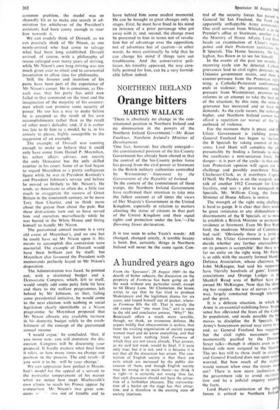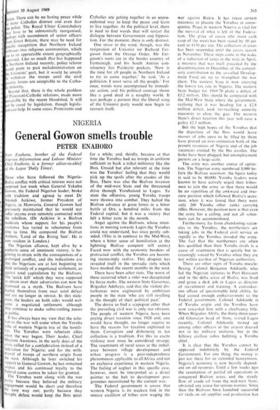NORTHERN IRELAND
Orange bitters
MARTIN WALLACE
'There is absolutely no change in the con- stitutional position in Northern Ireland and no diminuation in the powers of the Northern Ireland Government.'—Mr Brian Faulkner, Northern Ireland's Minister of Development.
'One fact, however, has clearly emerged— the constitutional position of the Six-County Government has already been altered in that the control of the Six-County police force has passed from the civil power at Stormont to the British military authorities controlled by Westminster..—Statement by the Government of the Republic of Ireland.
'In the context of the commitment of these troops, the Northern Ireland Government have reaflirmed their intention to take into the fullest account at all times the views of Her Majesty's Government in the United Kingdom, especially in relation to matters affecting the status of citizens in that part of the United Kingdom and their equal rights and protection under the law.'—The Downing Street declaration.
It is too soon to echo Yeats's words: All changed, changed utterly, A terrible beauty is born. But, certainly, things in Northern Ireland will never be the same again. Con-
trol of the security forces has passed General Sir Ian Freeland, the frank a apparently unflappable Army commander One civil servant from Whitehall is in t Premier's office at Stormont, another is. the Ministry of Home Affairs. Lord HI, heads an examination of Ulster's regul4 police and their Protestant auxiliaries, t B Specials. The Home Secretary, Mr laghan, has flown in to see for himself.
In the events of the past ten months, recurring cycle can be detected. CathoI grievances lead to civil rights demands; j Unionist government resists, and there counter-pressure from the Protestant righ wing; a Catholic-Protestant confrontati ends in violence; the government, und pressure from Westminster, promises we reforms in an attempt to take the heat o of the situation; by this time, the sense grievance has increased and so have demands. As the cycle recurs, the stakes t. higher, and Northern Ireland cannot no afford a repetition (or worse) of the la outbreak of violence.
For the moment there is peace, and t Ulster Government is yielding groun General Freeland has begun to 'de-fang. the B Specials by taking control of the arms; Lord Hunt will complete the jo presumably by finding a formula to ma the auxiliaries a non-sectarian force. danger—it is part of the cycle—is that mi tant Protestant opinion will again rise challenge and possibly overthrow Mat Chichester-Clark, as it overthrew Capta O'Neill. Mr Paisley is on the warpath, Si' talk of another 1912 Covenant for Ulm loyalists, and sees a plot to extinguish Specials. Mr. William Craig, the form Minister of Home Affairs, is restive.
The strength of the right wing challen is hard to gauge. It is clear that there woul be great resistance to any disbandment disarmament of the B Specials, or to mov to establish a British Minister in permane residence at Stormont. Even Mr Roy Bra ford, the moderate Minister of Commerc had said: 'Obviously there is a point which the Ulster Government has got t decide whether any further encroachme on its powers is acceptable'. But there is far no unity on the right wing. Mr Paisl is at odds with the recently formed Shanki Defence Association, whose chairman, John McKeague, had said his supporte have `literally hundreds of guns'. Union associations and Orange Lodges in t Shankill Road area of Belfast have d owned Mr McKeague. Now that the sh ing has stopped, the war of nerves is und way, largely conducted through televis and the press. It is a delicate situation, in which t Army is an essential stabilising force. Its p sence has alleviated the fears of the Cath lic population, and made possible the fi moves to discipline the B Specials. Army's honeymoon period may come to end, as General Freeland has suggest but the civil rights movement see momentarily pacified by the Down' Street talks—though it objects even to t limited role now assigned to the Specia The las has still to show itself in strengt and General Freeland does not seem undu worried. But how much of the stab'! would remain when once the troops mo out? There is now more inclination the government side to avoid recrimill tion and let a judicial enquiry establi the facts.
Lord Hunt's examination of the po forces is critical to Northern Irela
tare. There can be no lasting peace while many Catholics distrust and even fear police. The Royal Ulster Constabulary
y have to be substantially reorganised, rliaps with secondment of senior officers rom Great Britain; there may be need for pecific recognition that Northern Ireland mbraces two religious communities, which re to an appreciable extent geographically parated. Like so much that has happened n Northern Ireland recently, police reform mild point to past maladministration on he Unionists' part, but it would be unsafe 0 withdraw the troops until the civil urity forces are acceptable to the Catho- c minority. Beyond that, there is the whole problem f Protestant-Catholic relations, made more tractable by the recent bloodshed. It will ot be cured by legislation, though legisla- un can help. In some areas, Protestants and
Catholics are getting together in an unpre- cedented way to keep the peace and learn to live together. At the political level, there is need to find words that will restart the dialogue between Government and Opposi- tion. For the moment, there is only distrust.
One straw in the wind, though, was the resignation of Unionist MP Richard Fer- guson from the Orange Order. Mr Fer- guson's roots are in the border country of Fermanagh, and his South Antrim con- stituency has Paisleyite pockets. 'Now is the time for all people in Northern Ireland to try to come together,' he said. `As a politician, I must serve all the people.' For once, words were accompanied by immedi- ate action, and his political courage shone like a good deed in a naughty world. It was perhaps a portent that the liberal wing of the Unionist party would now begin to reassert itself.



































 Previous page
Previous page